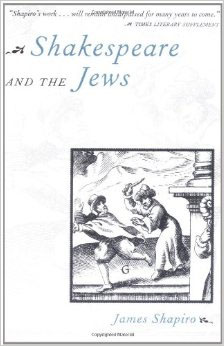 The exiled Jew could be treated politically, religiously, and racially as the antithesis of “Englishness”. He was simultaneously a secret, corrupting threat. As James Shapiro expresses it in Shakespeare and the Jews, “The Jew as irredeemable alien and the Jew as boogeyman into whom Englishmen could be mysteriously ‘turned’ coexisted at deep linguistic and psychological levels.”
The exiled Jew could be treated politically, religiously, and racially as the antithesis of “Englishness”. He was simultaneously a secret, corrupting threat. As James Shapiro expresses it in Shakespeare and the Jews, “The Jew as irredeemable alien and the Jew as boogeyman into whom Englishmen could be mysteriously ‘turned’ coexisted at deep linguistic and psychological levels.”
Perhaps the purest expression of the Jewish boogeyman can be found in the widespread tales of Jewish ritual murder which sprung up like wildfires throughout England during the 16th century. In the Jew of Malta, Christopher Marlowe collected these tales and personified them all in the villainous Jew Barabas, who brags:
I walk abroad o’nights,
And kill sick people groaning under walls:
Sometimes I go about and poison wells;
And now and then, to cherish Christian thieves,
I am content to lose some of my crowns,
That I may, walking in my gallery,
See ’em go pinion’d along by my door.
Being young, I studied physic, and began
To practice first upon the Italian;
There I enrich’d the priests with burials,
And always kept the sexton’s arms in ure
With digging graves and ringing dead men’s knells:
And, after that, was I an engineer,
And in the wars ‘twixt France and Germany,
Under pretence of helping Charles the Fifth,
Slew friend and enemy with my stratagems:
Then, after that, was I an usurer,
And with extorting, cozening, forfeiting,
And tricks belonging unto brokery,
I fill’d the gaols with bankrupts in a year,
And with young orphans planted hospitals;
And every moon made some or other mad,
And now and then one hang himself for grief,
Pinning upon his breast a long great scroll
How I with interest tormented him.
But mark how I am blest for plaguing them–
I have as much coin as will buy the town.
The Jew of Malta might have been fiction, but it reflected dozens of similar stories which were being published as nonfiction every year with virtually no written rebuttal or questioning of their veracity.
Interestingly, the first known repudiation of the charge that Jews committed ritual murder in the history of the world was also one of the few published in Elizabethan England. It was made available when Thomas Lodge translated Josephus’ rebuttal of Appion’s charges of Jewish ritual murder. (This becomes even more interesting when one considers that Thomas Lodge was an author well known to Shakespeare. Shakespeare would later adapt Lodge’s Rosalynde to the stage as As You Like It, but his entire early career was heavily influenced by the book’s cross-dressing heroines and comic conceits. It doesn’t take much imagination to say that Shakespeare was a fan of Thomas Lodge, making it likely that he was familiar with this Jewish self-defense.)
Shapiro writes again in Shakespeare and the Jews:
“Lodge’s translation describes how Antiochus, who invaded and desecrated the Jews’ Temple in 168 B.C., came upon a man held prisoner in the Temple. The man told Antiochus that ‘he was a Grecian’ who, ‘travelling in the country to get his living … was suddenly seized … and brought unto the Temple and shut up therein.’ He had been ‘fed or fatted with all dainties that could be provided,’ which ‘at first … made him joyful, but afterward he began to suspect it.’ Finally he demanded of his jailors why he was being kept there, and learned to his horror that ‘the Jews’ annually take ‘a Grecian stranger and feed him [for] a year’. At that time they ‘then carry him to a wood, and there … kill him and sacrifice him according to their rites and ceremonies, and … taste and eat of his entrails.’ Afterwards they cast the ‘residue of the murdered man … into a certain pit.’
The story contains all of the defining features of native versions of the accusation circulating in Lodge’s England: the yearly crime, the initial imprisonment of the victim, the cannibalistic devouring of the body, and the attempt to hide traces of the body and the crime. What sets Lodge’s book apart from earlier English accounts of Jewish ritual murder is his decision to include Josephus’ repudiation of this ‘forged lie’. This ‘fable’, Josephus argues, ‘is not only stuffed full of all tragical cruelty’ but is ‘also mingled with cruel impudency’. Josephus contested the accusation on factual grounds, and asks ‘how is it possible that so many thousand people as are of our nation, should all eat of the entrails of one man as Appion reporteth?’ Josephus first refutes the charge point by point and then concludes that it is ‘ignominious … for a grammarian not to be able to deliver the truth of a history’ and accusses Appion of ‘great impiety and a voluntary forged lie’ in spreading this myth.
In understanding the full scope of how the Jew existed as both Alien and Monster in Elizabethan culture and thought, we can now turn our attention towards Shakespeare’s The Merchant of Venice within the specific context in which it was written.
Originally posted on December 4th, 2010.












